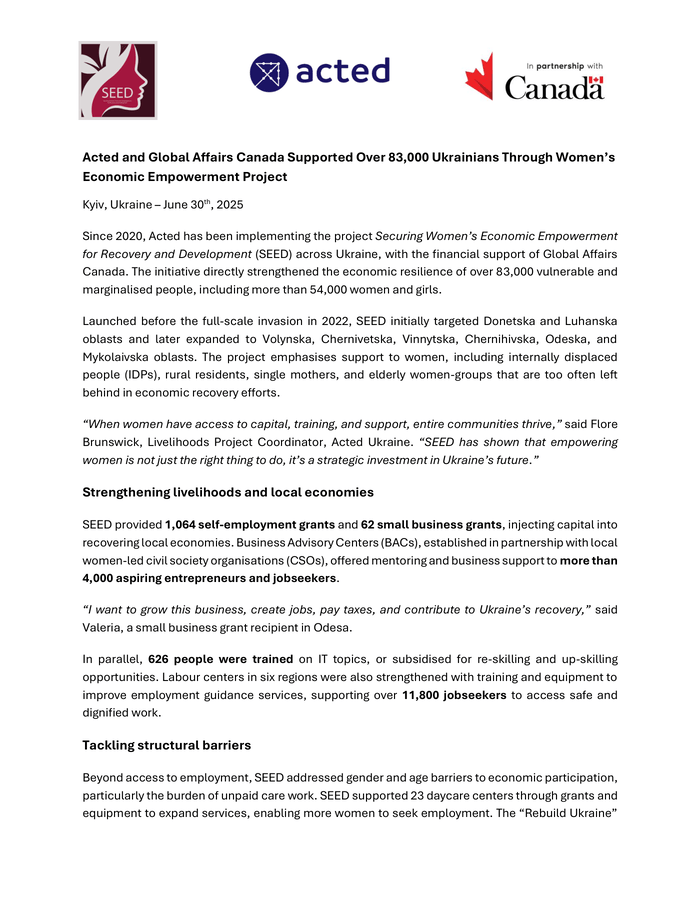In the shadow of Russia’s full-scale invasion, Ukrainian women have emerged not just as survivors but as economic pillars for their displaced communities. Through a groundbreaking initiative funded by Global Affairs Canada, over 83,000 Ukrainians have received critical support aimed at women’s economic empowerment since April 2022.
“When war shattered my business in Kharkiv, I thought everything was lost,” says Olena Petrenko, a 38-year-old former boutique owner who fled to western Ukraine. “The Canadian-supported program didn’t just provide financial assistance—it gave me the tools to reimagine my future when I couldn’t see one.”
The initiative, implemented by ACTED (Agency for Technical Cooperation and Development), has strategically targeted the economic vulnerabilities created by mass displacement. With women comprising roughly 90% of adult Ukrainian refugees, the program recognizes that empowering women economically strengthens entire communities.
Through a comprehensive approach combining direct cash assistance, small business grants, and vocational training, the program has established a sustainable support system. In regions like Lviv, Zakarpattia, and Chernivtsi—areas hosting large numbers of internally displaced persons—these interventions have proven particularly effective.
“What distinguishes this program is its recognition that women’s economic security requires more than temporary aid,” explains Dr. Natalia Kovalchuk, economic analyst at Kyiv School of Economics. “By investing in skills development alongside immediate financial relief, Canada has helped create pathways to self-sufficiency that will outlast the crisis.”
The program’s reach is impressive: over 7,300 households have received multi-purpose cash assistance, while more than 4,000 women have participated in specialized training sessions covering digital literacy, entrepreneurship, and market-relevant vocational skills.
For Canada, this initiative represents a strategic implementation of its Feminist International Assistance Policy, which prioritizes gender equality and women’s empowerment in international development efforts. Minister of International Development Ahmed Hussen has emphasized that supporting Ukrainian women’s economic resilience is both a humanitarian imperative and a strategic investment in the country’s future stability.
“We’re seeing remarkable resilience,” notes Maria Petryk, ACTED’s Ukraine Country Director. “Women who arrived with nothing have established small businesses, entered new professions, and created support networks that benefit entire communities. The ripple effects of economic empowerment extend far beyond individual households.”
The program has also adapted to evolving needs. Initial emergency cash assistance has gradually shifted toward sustainable livelihoods programming, with an increasing emphasis on business development support and integration into local economic systems.
Importantly, this support comes at a critical juncture in Ukraine’s political and economic landscape. With reconstruction costs estimated at over $400 billion and counting, sustainable economic empowerment programs represent essential investments in Ukraine’s future recovery.
As winter approaches and energy infrastructure remains vulnerable to attacks, the economic challenges facing displaced Ukrainians will intensify. Canada’s commitment to maintaining this support signals recognition of both the immediate humanitarian needs and longer-term stability requirements.
The question now facing international donors and Ukrainian authorities alike: how can successful models of economic empowerment be scaled and integrated into broader reconstruction efforts to ensure women remain central to Ukraine’s economic recovery rather than marginalized by it?























